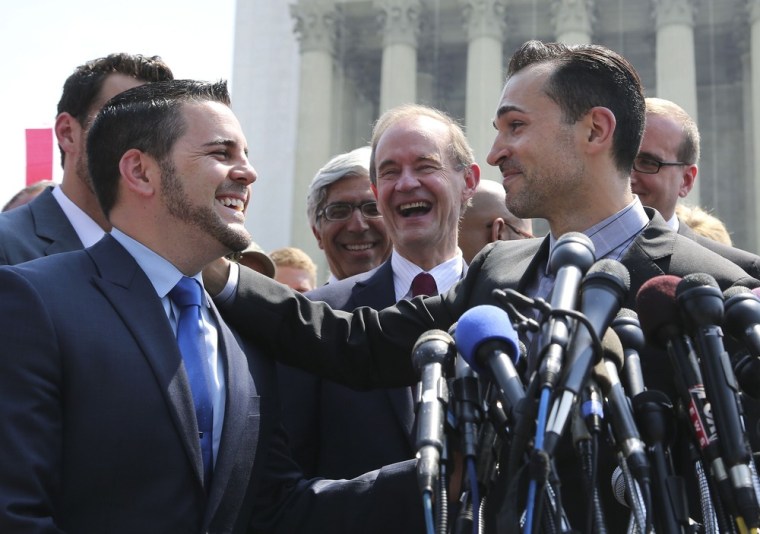The Supreme Court ruling on a California law known as Proposition 8 came down to a legal technicality but has huge practical effect — restoring gay marriage in the nation’s most populous state.
The court ruled that proponents of Proposition 8, a ban on gay marriage passed by California voters in 2008, did not have the legal right to defend the law in the federal courts.
Chief Justice John Roberts, writing for the court, said that the proponents — the people who put Proposition 8 on the ballot — had no “personal stake” in defending it, at least no more than other ordinary citizens of California.
“It is not enough,” Roberts wrote, “that the party invoking the power of the court have a keen interest in the issue.”
At issue was a legal standard known as standing — the standard that keeps just anyone from suing about just anything in the federal courts. To have a case, the standard says, you have to show harm.
The California Supreme Court ruled in May 2008 that gay couples had a right to marry. Six months later, Proposition 8 passed with 52 percent of the vote, halting gay marriage in California.
Two gay couples then sued in federal court to overturn the ban. State officials refused to defend the law, and a federal judge allowed its original proponents — again, the people who put it on the ballot — to step in.
The judge later ruled against Proposition 8 but suspended his ruling while its proponents had a chance to appeal. The Supreme Court said Wednesday that they had no case.
The ruling was important not just for what it did — clear the way for the resumption of gay marriage in California — but for what it didn’t do. The court made no ruling on whether there is a constitutional right to gay marriage.
“It just refused to decide anything,” said Tom Goldstein, the publisher of SCOTUSblog and a Supreme Court analyst for NBC News. He said the ruling amounted to: “We’re washing our hands of the case.”
The ruling was much narrower than the other major Supreme Court decision on Wednesday, which held that gay couples who are legally married in their states are entitled to federal benefits. Still, opponents of Proposition 8 were ecstatic.
“Today is a good day,” Paul Katami, who was among those challenging the law, said outside the court. Turning to his partner, Jeff Zarrillo, he said: “It’s the day I finally get to look at the man that I love and finally say: Will you please marry me?”
Later, answering a phone call from Air Force One, Katami invited the president to the wedding.
Gay marriage will not resume immediately in California. The Supreme Court clerk sent a letter to the appeals court Wednesday saying that that its formal judgment on the case will not be issued for at least 25 days.
It is up to the appeals court to take care of a formality — dissolving the original judge’s suspension of his order. California notified its clerks that they may have to wait a month or so. Lt. Gov. Gavin Newsom told NBC News that gay marriage would resume in California within 30 days.
“As soon as they lift that stay, marriages are on,” California Attorney General Kamala Harris told reporters. “The wedding bells will ring.”
The decision on the Defense of Marriage Act divided the court along its normal ideological lines: The four liberals voted to overturn it, the four conservatives voted to uphold it, and the swing vote, Justice Anthony Kennedy, made the difference.
Proposition 8 left the justices in a more unusual breakdown: Roberts was joined in the majority by three of the liberals and Justice Antonin Scalia, who had delivered a blistering dissent in the Defense of Marriage Act case.
Opponents of gay marriage took heart in pointing out that the court was clearly leaving it to individual states to define marriage.
“The battle is going to continue to be fought out at the states as we fully expected,” said John Eastman, chairman of the National Organization for Marriage, the leading group opposed to gay marriage.
Miranda Leitsinger of NBC News contributed to this report.
